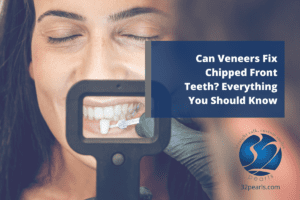Dentophobia or having a dental phobia means one is afraid of the dentist. We don’t mean a little nervous. We mean a serious case of fear that keeps people from going. So many people fear the dentist, and according to reports, 75% of the population does not want to go. Anxiety and dentist-related fear can be a big deal and will be the cause of serious health risks if a dentist is avoided. These fears are very real and validated. If you are looking for sedation dentistry services in Tacoma our dentists at 32 Pearls are capable of providing the best care available.
What people fear about the dentist
- The dentist or a past traumatic dental experience
- Association with a past traumatic medical experience with a doctor
- General fear of pain
- Fear of needles
- Fear of gagging
- Fear of the unknown
- Fear of not being in control
The solution will improve as patients learn their experience to the Dentist can be a relaxing, no-nonsense way to a healthier lifestyle. It is important to know and is perfectly okay for a dentist to treat the anxiety with sedation or anxiety relief medication.
For patients with anxiety towards dental procedures of any kind, we encourage you to ask for sedation. There are a variety of sedatives available to soothe the whole experience. Our staff is happy to assist with the topic.
Procedures for Sedation Dentistry in 32 Pearls Tacoma may include:
- Implant surgery
- Dentures
- Teeth extraction
- Periodontal surgery
- Root canal
Regardless of the procedure, you are having, anything that makes you uncomfortable needs to be addressed, and it is our concern that you are at ease.
32 Pearls treat patients with high anxiety. We will provide maximum comfort and safety.
Types of Sedation and General Anesthesia

Talk to the staff about Sedation. They will be happy to discuss which sedative is right for you.
- General anesthesia is administered by a professional to care for patient’s comfort and manage precautions. The patient is monitored for blood pressure, pulse, oxygen saturation, and respiratory.
- Nitrous oxide is also known as “laughing gas.” A mask is affixed to the patient’s nose to inhale the nitrous gas administered by a professional throughout the entire dental procedure. Only general anesthesia will put a patient fully into an unconscious state of sleep. A side- effect is the patient may not remember the procedure. Soon after, oxygen is given to reverse the nitrous for five minutes. The patient will fully awaken and will have the ability to drive.
- An oral sedative for nervousness such as diazepam relaxes a patient and keeps them awake. The patient takes sedatives before the appointment. Some may require a driver for the patient to or from the appointment.
- An Intravenous sedative is injected into the patient’s vein. The sedative induces “deep sleep” or “twilight” states. Intravenous sedatives may be used for dentures or implants.
Benefits of Sedation
- Eliminates pain
- Eliminates discomfort
- Aides in gag-reflux
- Anti-anxiety
- Minimize fear of Dentist
- Eases temporomandibular joint dysfunction (TMJ)
- Eases complex surgery procedures
- Soothes uncomfortable extractions
- Eases post-traumatic medical experiences or other
Suggested ways to cope with a paralyzing dentist related fears
- Talk to a counselor who can provide cognitive-behavioral therapy
- Have a pre-meeting with the staff at 32 pearls to talk about your fears
- Bring your favorite music, cell-phone, and earphones
- Play soothing classical music or any kind of happy music
Sedation Information
The risk of general anesthesia is patient may not remember the entire procedure. Sedatives may take time to wear off, depending on the patient.
ADA (American Dental Association) provides Guidelines for the usage of Sedation and General Anesthesia by dentists.





